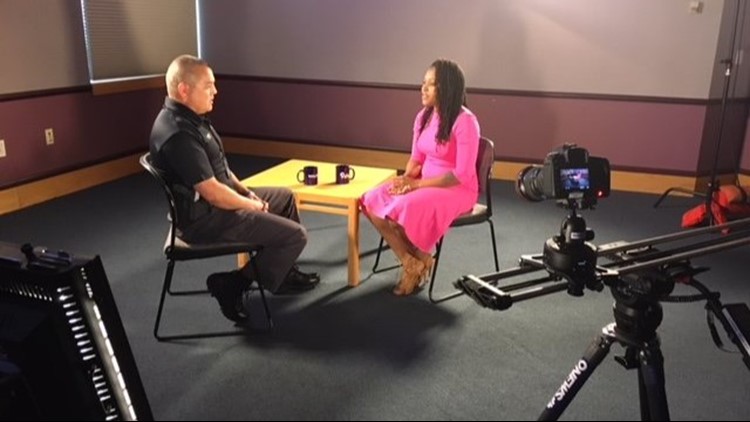DENVER — Sometimes changing an established view of the world comes from an unexpected place.
This was the case for Carolyn Taylor, a manager at DU’s Office of Diversity and Inclusion, who happens to be African American, and Det. Jose Hurtado, a 23-year veteran of the Denver Police Department.
Taylor and Hurtado both attended the DPD's Back to Basics class launched in January 2017. All Denver officers and civilian employees are required to take the class, which is meant to help them rediscover why they signed up for the job in the first place.
More than 1,300 employees have gone through the 40-hour course, with 500 more are scheduled to complete it by the end of summer 2019.
The week-long class also includes connecting with the community, discussing ethics of policing, use of force and talking about how officers interact with the people they serve.
Taylor said the class opened her eyes to policing work and gave her hope.
"We can change the narrative of how there is a tension between blacks and cops, but we have to [be] informed to do that," Taylor said. Taylor still regularly attends the class.
Hurtado said the class showed him how to become more empathetic and made him a better husband.
"(I) kind of had an epiphany in the class," he said. "When they put some character traits up on the board, I can kind of see them in myself, and it was difficult to admit that that’s the point I was at in my career and my life."
'I wanted to keep the rhetoric of the awful police officer'
In December 2016, Taylor was starting an internship for her master's degree, and she said she was angry about the number of African Americans being shot and killed by police.
"As a black female, I didn’t feel like America was my place. My people were getting shot, and it didn’t seem like it was important to officers nationwide," Taylor said.
Taylor -- now an adjunct professor of intercultural communication and a manager at DU's Office of Diversity and Inclusion -- said she wanted to understand more about police work and called DPD's police chief at the time, Robert White. White announced his retirement in April.
"I called with a hope actually he would say 'no,'" Taylor said. "I wanted to keep the rhetoric of the awful police officer, right? He was unapologetically welcoming. ... I told him exactly how I felt, exactly what I wanted to learn, and he was open to it."
"I came in here with a lot of bias," she added.
White referred Taylor to Denver Police Academy and Technician Tyrone Campbell, one of the instructors for the Back to Basics class.
“Carolyn came to us wanting to gain knowledge, she had some questions,” Campbell said. “We’re an open book. Let’s have a civil discourse in why you have this thought or that belief, and in having those conversations, we found it was a perfect fit in what it is that we’re doing.”
"I had a lot of questions,” Taylor said to a room full of officers during one class in early 2018. “I didn’t have positive interactions that outweighed my negative interactions. [Now] I understand more, and I have more courage to speak to officers on the street.”
Taylor's participation in the class has also helped shape its curriculum.
"She’s brought to us a very different perspective; we’ve welcomed her seat at that table,” Campbell said.
'Stuff you don’t necessarily want to listen to'
Hurtado, the DPD detective, said he initially rolled his eyes when he learned he had to take the Back to Basics class.
“Hours sitting in a classroom, listening to stuff you don’t necessarily want to listen to,” he said. “There were a couple of classes before mine, most of the people that came out of those classes didn’t have very positive feedback from their experience, so I kind of went into it...with low expectations, so to speak.”
Hurtado, a 23-year DPD veteran, said seeing things like child abuse, domestic violence, auto accidents, shooting and stabbings on a daily basis had taken its toll.
"I think there are only so many things you can see before it starts to effect you, how you view the outside world. I think it can kind of close you into a box," Hurtado said.
The class, he said, helped him see he'd become a person he didn't want to be.
"It allowed me to communicate a little more openly with my wife, number one, and also my coworkers and the public in general," Hurtado said. "I was able to become a lot more empathetic, a lot more understanding."
Changing the narrative
Hurtado and Taylor said the Back to Basics class changed their perspectives.
"I think it helps to humanize officers, to humanize the uniform, to humanize the profession, particularly in the black community. That’s why I’m here," Taylor said.
Hurtado added that the class did exactly what it was intended to do -- opened his eyes to why he became a cop in the first place.
"I can approach things in a different manner and still have the same outcome, still be professional, still get my job done, but do it with a little more grace," Hurtado said.



